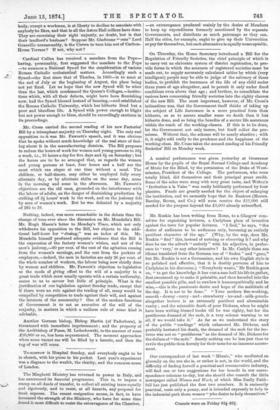Nothing, indeed, was more remarkable in the debate than the
change of tone ever since the discussion on Mr. Mundella's Bill. Mr. Hugh Mason's letter to Monday's Times, which not only withdraws his opposition to the Bill, but objects to the addi- tional half-hour for " closing," was an index of this. Mr. Mundella himself produced adequate evidence that the Bill is the expression of the factory women's -wishes, and not of the men's jealousy,-60 per cent. of the cost of the agitation coming from the women's earnings, and the rest from the pockets of employers,—indeed, the men in factories are only 26 per cent. of the whole number of workers, the labour being now chiefly done by women and children. Mr. Fawcett's objection to legislation as the mode of giving effect to the will of a majority in a great trade which must usually operate with a certain uniformity, seems to us to savour but little of principle. What is the justification of our legislation against Sunday trade, except that if there were no rule against the trading of all, many would be ..compelled by competition to trade against their will, and against the interests of the community? One of the modern functions of Government is to act as executive of the will of the -majority, in matters in which a uniform rule of some kind is advisable.


































 Previous page
Previous page